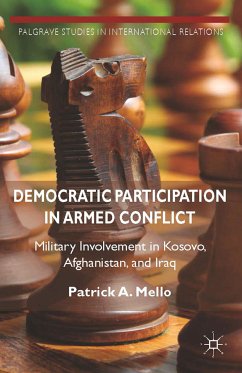
The Politics of Civil-Military Cooperation (eBook, PDF)
Canada in Bosnia, Kosovo, and Afghanistan
Versandkostenfrei!
Sofort per Download lieferbar
40,95 €
inkl. MwSt.
Weitere Ausgaben:

PAYBACK Punkte
20 °P sammeln!
Ankersen examines Canada's civil-military cooperation efforts in Kosovo, Bosnia, and Afghanistan through the lens of Clausewitz's 'Remarkable Trinity'. The book reveals how military action is the product of influences from the government, the armed forces, and the people at home.
Dieser Download kann aus rechtlichen Gründen nur mit Rechnungsadresse in A, B, BG, CY, CZ, D, DK, EW, E, FIN, F, GR, HR, H, IRL, I, LT, L, LR, M, NL, PL, P, R, S, SLO, SK ausgeliefert werden.












